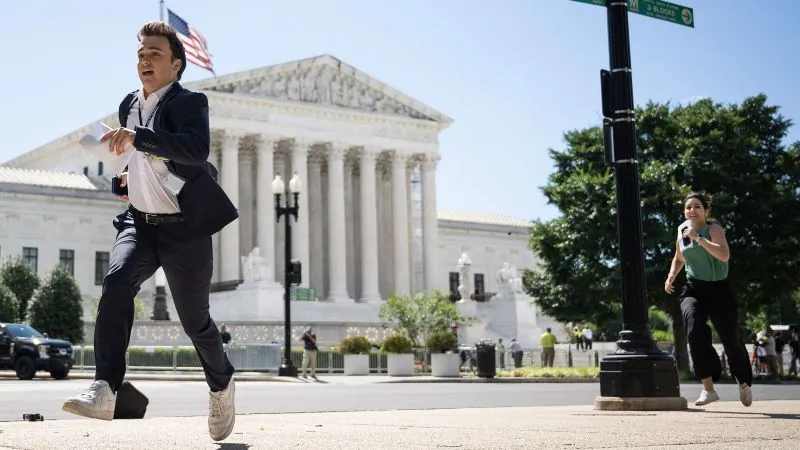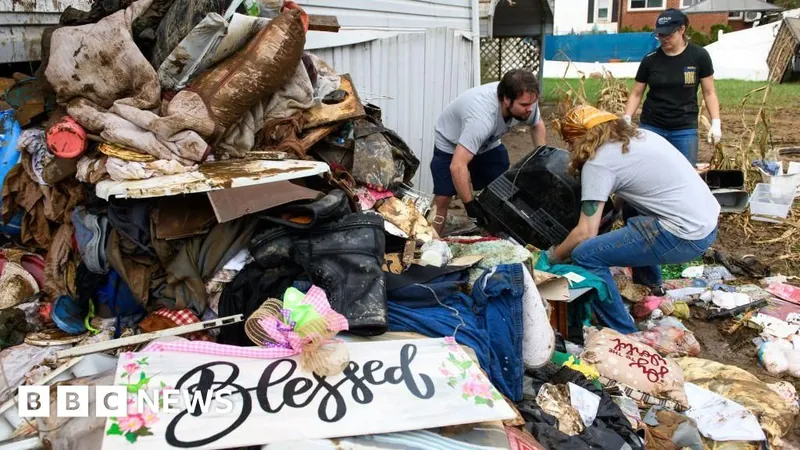
Supreme Court Gears Up for Turbulent Times Ahead of Election Season
2024-10-06
Introduction
As the Supreme Court reconvenes this Monday, it faces a diverse docket that includes critical issues surrounding guns, pornography, and transgender medical care. The justices are bracing for a wave of contentious cases stemming from an unpredictable election cycle and a new presidential administration that threatens to push the Court even deeper into the political fray.
Current Docket and Political Context
So far, the Court has agreed to hear approximately 40 appeals, but only a small fraction entails the intense political disputes that have characterized its recent history. This relative calm, however, may be fleeting. With Vice President Kamala Harris potentially facing off against former President Donald Trump in a closely contested election, the 6-3 conservative majority could find itself embroiled in a whirlwind of political controversy. Notably, Trump's return to the Court is almost guaranteed as he seeks clarification on the sweeping criminal immunity the Court granted him earlier this year.
Ahead of the first oral arguments of this new term, which will continue until summer 2024, seasoned Supreme Court litigator Carter Phillips remarked, 'As it stands now, it feels like the Court is keeping its powder dry in case the election explodes,' referring to the current lack of high-profile cases on the docket.
Significant Cases on the Agenda
One of the significant matters on Tuesday's agenda centers on the Biden administration's regulation concerning 'ghost guns.' Advocacy groups and manufacturers are challenging the administration's assertion that these mail-order kits—allowing individuals to construct untraceable firearms at home—should be classified as firearms under the law. A lower court has previously ruled that the Bureau of Alcohol, Tobacco, Firearms, and Explosives exceeded its authority in this case, and the Supreme Court's decision will help define federal regulatory powers over such weapons.
Additional cases of interest include a First Amendment dispute initiated by the adult entertainment industry, which is contesting a Texas law requiring age verification for adult websites. The Court is also set to review whether a federal statute prohibits Mexico from suing gun dealers accused of supplying firearms to drug cartels, and a discrimination case brought by a woman against her gay employer.
Perception and Credibility of the Court
While the Court's upcoming term appears less politically charged than previous years—where landmark decisions included the overturning of Roe v. Wade—the rising tensions surrounding its legitimacy cannot be ignored. A recent Annenberg Public Policy Center poll revealed that 56% of Americans disapprove of the Supreme Court, highlighting a growing distrust. Compounding the issue, the Court has faced a series of embarrassing leaks related to internal discussions, further straining its credibility.
Concerns of Political Battle
Chief Justice John Roberts may be particularly wary of rekindling political battles during this term. The specter of Bush v. Gore, a controversial ruling that effectively determined the outcome of the 2000 presidential election for George W. Bush, looms large. Former Justice Sandra Day O'Connor has expressed regrets about the Court's role in that case, emphasizing the importance of maintaining the Court’s institutional legitimacy.
Election Litigation and Administrative Changes
As the landscape shifts and pre-election lawsuits flood in, the potential for the Court to influence upcoming electoral battles looms. Legal experts remain uncertain about the volume and nature of election-related litigation. Kannon Shanmugam, an attorney experienced in Supreme Court cases, remarked that 'it’s impossible to predict' how the situation will develop as election dates approach.
Furthermore, a change in administration typically triggers rapid policy shifts that invite legal challenges, such as Trump’s controversial travel ban, which saw multiple visits to the Supreme Court. The current term includes a pivotal case involving gender-affirming care, which could be impacted by a change in presidential administration. With nearly half of U.S. states enacting such bans, the implications of the Supreme Court’s rulings will resonate far beyond individual cases.
Conclusion
As Justice Ketanji Brown Jackson encapsulates, the Court is preparing for what lies ahead as election season looms. When asked about her readiness in light of the impending election, she responded, 'As prepared as anyone can be.'
With all eyes on the Supreme Court, both citizens and officials alike are left wondering just how much the next few months could shape the nation's judicial and political landscape. Stay tuned as events unfold!









 Brasil (PT)
Brasil (PT)
 Canada (EN)
Canada (EN)
 Chile (ES)
Chile (ES)
 España (ES)
España (ES)
 France (FR)
France (FR)
 Hong Kong (EN)
Hong Kong (EN)
 Italia (IT)
Italia (IT)
 日本 (JA)
日本 (JA)
 Magyarország (HU)
Magyarország (HU)
 Norge (NO)
Norge (NO)
 Polska (PL)
Polska (PL)
 Schweiz (DE)
Schweiz (DE)
 Singapore (EN)
Singapore (EN)
 Sverige (SV)
Sverige (SV)
 Suomi (FI)
Suomi (FI)
 Türkiye (TR)
Türkiye (TR)